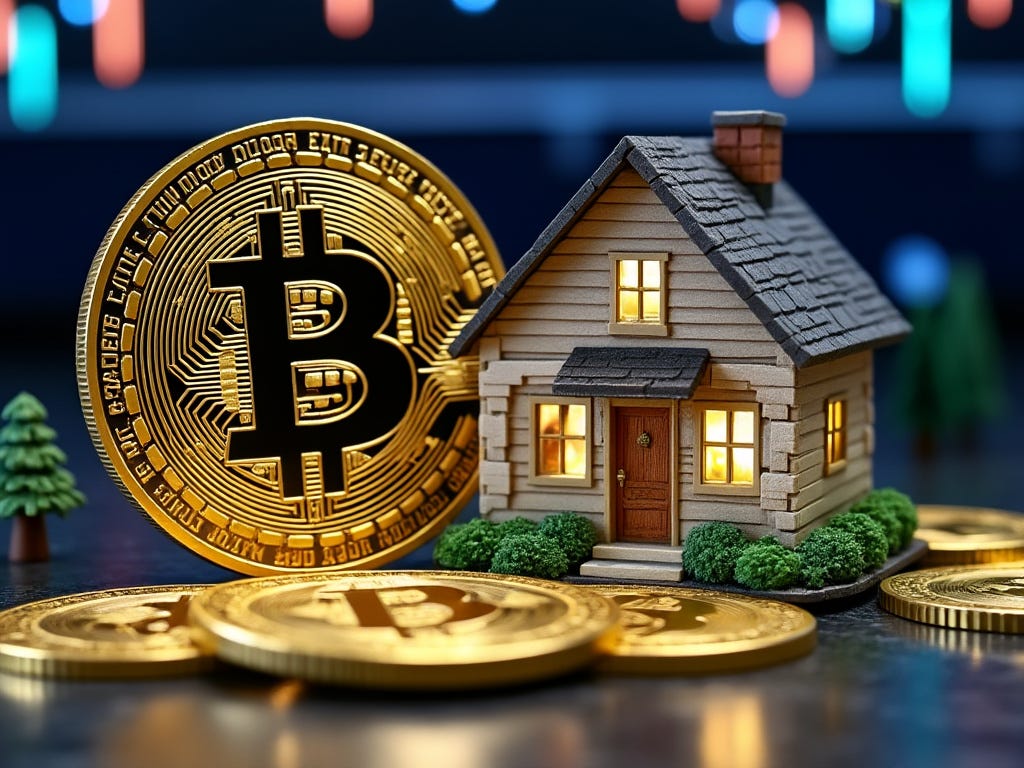
In the past decade, cryptocurrency has transformed from an internet curiosity to a global financial movement. Bitcoin, Ethereum, and a variety of other digital currencies are no longer merely investment instruments; they are gradually being recognized as legitimate mediums of exchange. The increasing potential to purchase high-value products such as residences and vehicles using cryptocurrency is one of the most intriguing developments in this field.
Therefore, what is the extent of our progress on this journey? Is it possible for an individual to purchase a car or a property using Bitcoin today? Furthermore, what will it require for crypto to become a broadly acknowledged method for making such significant purchases?
A Novel Form of Asset Exchange
Banks, loans, credit ratings, and extensive paperwork have been traditionally associated with the acquisition of a residence or vehicle. A fundamentally different approach—one that is potentially more secure, borderless, and faster—is provided by cryptocurrency. A number of high-profile real estate and vehicle transactions have been completed in recent years using Bitcoin and other digital assets, indicating that what was once considered impossible is now becoming increasingly feasible.
Real-World Illustrations
* **Real Estate**: Bitcoin has been utilized to sell a variety of properties, including Miami condos and villas in Portugal. In certain instances, vendors are crypto investors who are delighted to engage in peer-to-peer transactions. In other cases, payment processors convert crypto into fiat for the vendor, while the consumer pays in digital currency.
* **Automobiles**: Crypto payments are accepted by numerous prestige and exotic car dealerships worldwide. Bitcoin, Ethereum, and stablecoins have been employed to acquire Lamborghini, Tesla, and motorcycles.
These examples serve as evidence that it is not only feasible, but also currently transpiring. Nevertheless, the utilization of cryptocurrency in these sectors is still not prevalent.
The Reasons Why Individuals Are Utilizing Cryptocurrency to Purchase Automobiles and Homes
1. **Efficiency and Speed**
Especially for international purchasers, traditional bank transactions can take days or weeks to complete. Even when transacted across borders, cryptocurrency transactions can be finalized in mere minutes.
2. **International Accessibility**
Digital currencies simplify the process of obtaining property and vehicles in countries where banking regulations may otherwise be prohibitive for non-residents or unbanked individuals.
3. **Discounted Fees**
Buyers and vendors can reduce processing and transfer fees by circumventing banks and third parties.
4. **Security and Transparency**
Blockchain recordings are tamper-proof and permanent, which aids in the verification of payment history and the prevention of fraud.
Remaining Obstacles
Although the progress is encouraging, there are still a number of obstacles to overcome before cryptocurrency becomes a prevalent method for making substantial purchases:
* **Volatility**: The potential for significant price fluctuations in cryptocurrencies renders the pricing of property or vehicles in crypto a hazardous proposition for sellers.
* **Regulatory Uncertainty**: The legal and tax implications of crypto property transactions are complicated by the lack of clarity in the laws of numerous countries.
* **Restricted Institutional Support**: Traditional mortgage lenders and banks continue to be hesitant to acknowledge crypto assets, which presents a challenge for purchasers who wish to finance their purchases with cryptocurrency.
* **Adoption Gaps**: Traditional methods are still preferred by a significant number of merchants and dealerships, and not all of them are comfortable accepting cryptocurrency.
The Function of Payment Processors and Stablecoins
The increasing prevalence of **stablecoins** such as USDC or USDT is one potential remedy to the volatility of crypto currencies. These coins are pegged to fiat currencies, which provides price stability while maintaining the advantages of blockchain-based payments.
Furthermore, **payment processors** such as BitPay and CoinPayments serve as intermediaries between conventional finance and cryptocurrency, permitting sellers to accept cryptocurrency while simultaneously receiving fiat. This reduces the entry barrier and facilitates a more seamless transition for individuals who are new to digital currencies.
Prospective
The use of digital currencies for significant asset purchases is expected to increase as crypto adoption continues to expand and regulations continue to mature. Potential future developments may encompass:
* **Crypto-backed mortgages** * **Smart contracts for escrow and title transfers** * **Deeds and ownership records held on blockchain** * **Mainstream real estate platforms accepting crypto payments**
These innovations have the potential to revolutionize the way we purchase and sell residences and vehicles, thereby enhancing the process’s global reach, efficiency, and security.
In conclusion,
The journey toward purchasing residences and vehicles with cryptocurrency is currently ongoing, propelled by innovation, global demand, and a desire for financial alternatives. It is no longer merely a theory; it is a real, viable path that more consumers and vendors are beginning to explore, despite the fact that it is not yet the norm.
As the traditional economy becomes more integrated with crypto, the process of purchasing a vehicle or house with Bitcoin may soon be as straightforward as scanning a card or signing a check. The future of significant purchases may be digital, decentralized, and accessible with just a few keystrokes.
Leave a Reply